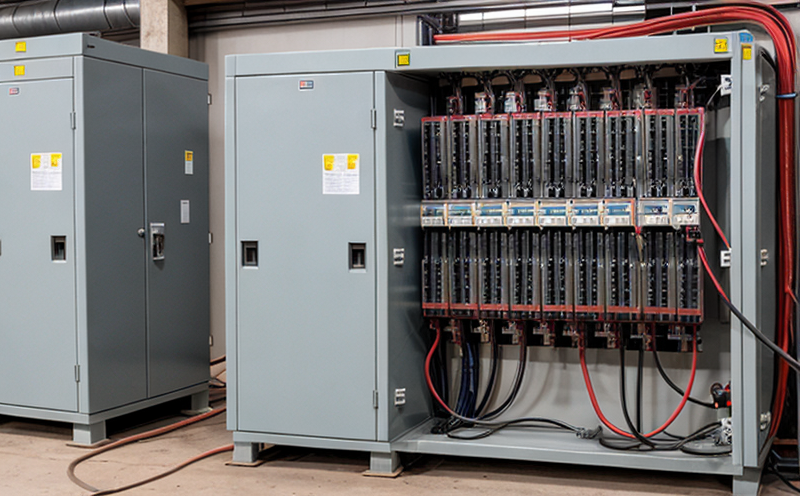IEEE C57 Transformer Standard Routine and Type Testing
The IEEE C57 standard is a cornerstone in the field of power and utilities testing. It provides comprehensive guidelines for ensuring transformer integrity, reliability, and safety. Transformers are critical components in electricity distribution networks, serving to step-up or step-down voltage levels as required by the system. The IEEE C57 standard ensures that transformers meet stringent performance requirements before they enter service.
The routine testing process under IEEE C57 encompasses a series of detailed inspections and tests aimed at verifying various aspects of transformer performance. These include insulation resistance measurement, winding resistance determination, no-load loss and no-load current measurements, load loss and impedance voltage determination, temperature rise testing, and partial discharge testing.
For type testing, the process is more rigorous, involving additional procedures to ensure that a new design or model meets all specified performance criteria. This includes dielectric strength tests, short-circuit withstand capability tests, and other specialized tests depending on the transformer's intended application. The results of these tests are crucial for ensuring compliance with international standards such as ISO 12126:2017.
Our testing facilities at Eurolab utilize state-of-the-art equipment to perform these tests accurately and efficiently. Our team of experienced engineers ensures that each test is conducted under controlled conditions, adhering strictly to the IEEE C57 standard. This rigorous approach guarantees that the transformers we test meet not only current standards but also anticipate future demands.
Compliance with IEEE C57 is essential for ensuring reliable and safe operation of power systems. Non-compliance can lead to costly downtime, safety hazards, and reputational damage. By adhering to this standard, our clients can rest assured that their transformers are robust and dependable, meeting both current operational needs and future regulatory requirements.
The importance of routine testing cannot be overstated in the power industry. It helps in early detection of potential issues before they escalate into major problems. Routine inspections also provide valuable data for predictive maintenance strategies, helping to extend the lifespan of transformers and reduce unnecessary replacements or repairs.
Type testing is equally critical as it ensures that new transformer models meet all necessary performance criteria from the outset. This reduces the risk of design flaws and inconsistencies in manufacturing batches, leading to higher quality products and increased customer satisfaction.
Applied Standards
The IEEE C57 standard is widely recognized and applied across the globe for transformer testing. It is complemented by other international standards such as ISO 12126:2017, which provides additional guidance on insulation tests. ASTM D94, a U.S.-based standard, also contributes to the comprehensive framework of transformer testing.
The IEEE C57 standard includes detailed procedures for routine and type testing that are essential for ensuring transformers meet all necessary performance criteria. Routine tests include insulation resistance measurement, winding resistance determination, no-load loss and no-load current measurements, load loss and impedance voltage determination, temperature rise testing, and partial discharge testing.
Type tests go further by including dielectric strength tests, short-circuit withstand capability tests, and other specialized tests depending on the transformer's intended application. These comprehensive tests ensure that transformers are not only reliable but also capable of withstanding operational stresses without compromising safety or performance.
Eurolab Advantages
Eurolab is committed to providing the highest quality transformer testing services, leveraging advanced technology and expertise. Our facilities are equipped with state-of-the-art equipment that allows us to conduct tests under controlled conditions, ensuring accuracy and reliability.
We employ a team of highly skilled engineers who are well-versed in IEEE C57 standards. Their extensive experience ensures that each test is conducted meticulously, adhering strictly to the specified procedures. This approach guarantees that our clients receive comprehensive reports detailing all aspects of the testing process, providing valuable insights into their transformers' performance.
Our commitment to quality extends beyond just conducting tests; we also offer expert advice and recommendations based on our findings. This proactive approach helps our clients make informed decisions about maintenance schedules, upgrades, or replacements as needed.
In addition to routine testing, Eurolab provides comprehensive type testing services that go above and beyond the basic requirements of IEEE C57. By incorporating additional tests and procedures, we ensure that new transformer models meet all necessary performance criteria from the outset. This reduces the risk of design flaws and inconsistencies in manufacturing batches, leading to higher quality products and increased customer satisfaction.
Our dedication to excellence is reflected in our certifications and accreditations with recognized bodies such as ISO/IEC 17025:2017. These credentials demonstrate our commitment to providing reliable and accurate testing services that meet the highest industry standards.
Customer Impact and Satisfaction
Eurolab's transformer testing services have a profound impact on customer satisfaction by ensuring that transformers are reliable, safe, and compliant with international standards. By adhering to the strictest protocols outlined in IEEE C57, we help our clients meet current operational needs while anticipating future regulatory requirements.
Our thorough routine tests enable early detection of potential issues, allowing for timely intervention and maintenance actions. This proactive approach helps extend the lifespan of transformers and reduces unnecessary replacements or repairs, ultimately saving our clients time and money.
Type testing is particularly beneficial in ensuring that new transformer models meet all necessary performance criteria from the outset. By incorporating additional tests and procedures, we reduce the risk of design flaws and inconsistencies in manufacturing batches, leading to higher quality products and increased customer satisfaction.
Our comprehensive reports provide valuable insights into transformers' performance, helping our clients make informed decisions about maintenance schedules, upgrades, or replacements as needed. This data-driven approach ensures that our clients are well-prepared for any challenges they may face in the future.
The impact of our services extends beyond just compliance; it also contributes to operational efficiency and safety. By ensuring transformers meet all necessary performance criteria, we help prevent costly downtime and potential hazards associated with equipment failures. This proactive approach not only enhances customer satisfaction but also strengthens our clients' reputations in the industry.





